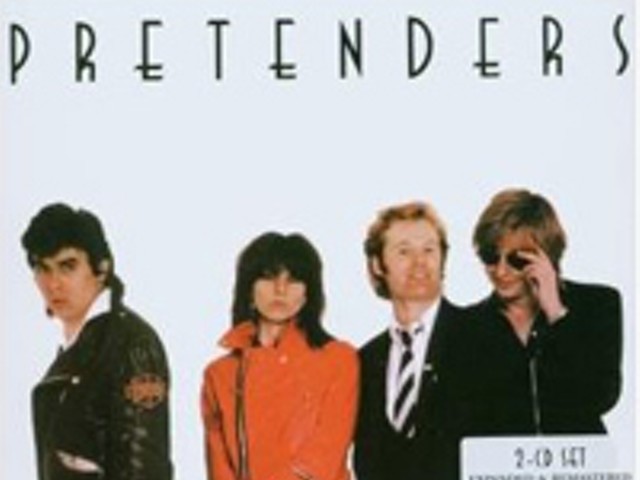A spectacle took place last week in downtown Detroit. About 120 men, representatives of local indie record labels, marched through the streets to reaffirm the sense of unity that Detroit hip hop lost quite some time ago. And it was led by an artist named Al Nuke.
The men chose Nuke (real name Curtis Franklin) because, symbolically, he is to Detroit hip hop what, say, Bun B. is to Houston hip hop — an intelligent, round-the-way guy with a worldly perspective. Nuke's been involved in some bad shit, but he survived, matured and grew. And he did all of this without separating from his roots.
Those roots are on the streets of Nuke's east side neighborhood. Over the course of five albums since 1996, he's used hip hop as his means of helping to rehabilitate the community's collective self-image. His latest album, Where Nuke At?, has the heady sonic mix of soul and boom-bap for which Detroit producers are known. But Nuke also sounds more comfortable with his baritone than he did on previous records like Under Pressure or Lifestyles of the Rich and Infamous, and he uses it to cruise through subjects ranging from neighborhood politics to calls for self-love.
Nuke has also added film credits to his résumé over the years, solidifying his status as an everyman for Detroit hip hop. He wrote, directed and co-starred in a locally produced crime caper called 17000 Block, co-directed the documentary Street Life and has several music videos to his credit. Being a multiplatform threat is part of his larger goal, to secure a national record deal.
"My relationships at the majors keep telling me," he says, "if I can sell 10,000 records and get 70 weekly spins on radio, I'm good. So I'm trying to sell 30,000."
Nuke understands how hard it is to claim your manhood in the ghetto. A troubled youth, he was saved by the power of his own personality — and a few good graces. "This is the dude that they was looking for," he says, referring to himself and the police, with whom he had frequent run-ins growing up. He tells the story of being an abused foster child who found himself homeless by age 13. "Sippin' coffee in coney islands with bums," he remembers. "Living in dope houses between 13 and 21; caught an attempted murder case at 21."
Nuke's career had just started to take off. The hood knew his talent — 5ELA, the rap group that then boasted an emerging talent named Proof, had opened for him at shows. But while he was recording his Lifestyles album, a situation with a friend got dangerously out of hand, as Nuke relates it. The friend impregnated Nuke's niece and, when the resulting friction escalated, the friend attacked him. Nuke shot him and ended up on the run, literally.
"It was a high-speed chase. I'm doing 100 miles per hour in my truck. I turned the corner at 80, and the truck turned over. I looked up, and the white boys got 20 guns in my face. They had blocked off Six Mile." Fortunately, for Nuke, prominent Detroit defense attorney Cornelius Pitts took the case. Nuke claimed self-defense and, facing 8-16 years, stood by his argument and won an acquittal. After the trial Pitts became a mentor to Nuke, who also found a surrogate brother in WJLB-FM 97.9 personality Art in the Dark.
Sadly, Nuke's friendship with Art was wiped out almost as soon as it developed when Art was diagnosed with cancer in May 1998. His health deteriorated in a matter of weeks, and he passed away quickly. Nuke says discussing him is still difficult, nearly a decade later.
But Art and Nuke had gotten into some serious community activity. It was a new day. They participated as panelists and supporters with the NAACP's pre-Russell Simmons hip-hop summits in the late 1990s. Nuke stepped out of his old skin, working with voting drives for Kwame Kilpatrick's campaign for state representative, Jennifer Granholm's first gubernatorial campaign and Al Gore's presidential campaign. He also began sharing his new experiences with his rap following.
And he also strengthened his swagger in hip hop. He recorded with underground nationals like L.A.'s Yukmouth and Bad Azz, did a remix of Jay-Z's hit "Excuse Me Miss" and became one of the premier representatives among local hip-hop independents.
These days Nuke, who stands about 5-feet-10-inches and nods and stares intently when speaking, will take opportunities during his shows to talk to crowds about cutting through hip-hop's muck and getting our collective shit together. At home, not on stage. Whether it's trimming bushes that rise halfway to the top of your house, helping a crackhead uncle get clean or encouraging education about the stock market, he'll send out calls to responsibility. And unlike most, he's able to talk to the hood, not at it.
And it listens.
"It's the ultimate definition of keepin' it real, and I hope you print that," Nuke says. "To me, I am the average human being that won't lie, but will put his private life and his skeletons out to the world."
Where Nuke At? is easily his most sobering album. In the past two years, Proof, Blade Icewood of Street Lordz, and East Side Chedda Boyz honcho Wipeout have all been murdered. Nuke knew all of them; each hailed from or had ties to the east side of town. Blade and Proof even recorded three tracks for Nuke's new album.
"I'm thinking these dudes gonna be here to perform this with me," Nuke says. "I was spooked. I look back and see the work they did and I'm like 'Damn! What happened?' This is what it's comin' to? Do niggas gotta die for people to say that they was great?"
Nuke says his goal now to is reverse the trend of despair. On his Comcast TV show, Nuke at Night (airs 2:30 a.m. weeknights on Channel 71 in Detroit), he uses sketch comedy and adult commentary to drive home points. A typical monologue on drug abuse: "Yo, man. Quit poppin' ecstasy, snortin' fuckin' cocaine. Quit! That's for dummies. We smoke 'ghan [read: Afghan weed], we drink liquor. We do what we do. But all of that ecstasy, cocaine? You a fuckin' loser. Leave that shit somewhere else. Detroit niggas don't do that."
For all of his work on and off the mic, it's appropriate that Nuke was nominated for a Lifetime Achievement honor at this year's Detroit Music Awards. It was a full-circle moment for the rapper, and a nod to his leadership. For Nuke, however, the recognition is another signal of his movement up, out and beyond, of leaving behind trouble in favor of progress and true manhood. Or, like the march he led that day in downtown Detroit, of forward movement.
Khary Kimani Turner is a freelance writer for Metro Times. Send comments to [email protected]




